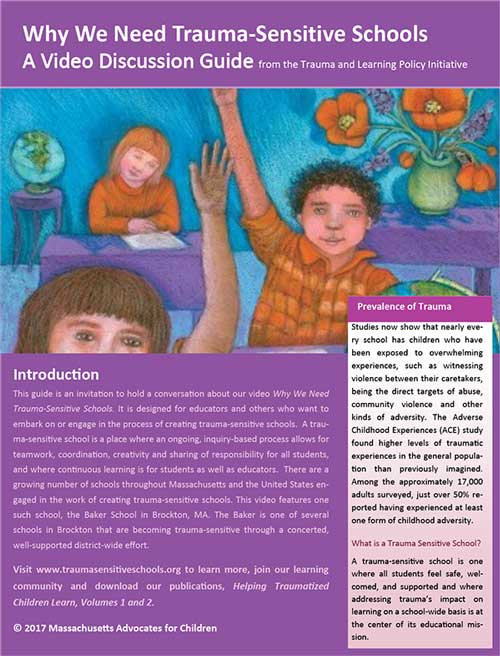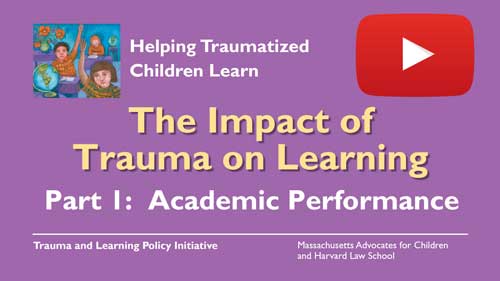Why We Need Trauma-Sensitive Schools
A Video Discussion Guide
Introduction
 This guide is an invitation to hold a conversation about our video Why We Need Trauma-Sensitive Schools. It is designed for educators and others who want to embark on or engage in the process of creating trauma-sensitive schools. A trauma-sensitive school is a place where an ongoing, inquiry-based process allows for teamwork, coordination, creativity and sharing of responsibility for all students, and where continuous learning is for students as well as educators. There are a growing number of schools throughout Massachusetts and the United States en-gaged in the work of creating trauma-sensitive schools. This video features one such school, the Baker School in Brockton, MA. The Baker is one of several schools in Brockton that are becoming trauma-sensitive through a concerted, well-supported district-wide effort.
This guide is an invitation to hold a conversation about our video Why We Need Trauma-Sensitive Schools. It is designed for educators and others who want to embark on or engage in the process of creating trauma-sensitive schools. A trauma-sensitive school is a place where an ongoing, inquiry-based process allows for teamwork, coordination, creativity and sharing of responsibility for all students, and where continuous learning is for students as well as educators. There are a growing number of schools throughout Massachusetts and the United States en-gaged in the work of creating trauma-sensitive schools. This video features one such school, the Baker School in Brockton, MA. The Baker is one of several schools in Brockton that are becoming trauma-sensitive through a concerted, well-supported district-wide effort.
Download the Complete Discussion Guide Here
Video Discussion Guide Questions
- What are your initial thoughts after watching the video? What is your understanding of trauma-sensitive schools?
- This video highlights the importance of leadership—superintendents, assistant superintendents, principals, and educators—in creating the understanding and infrastructure that can support the team work among staff needed for all children to be successful. How is this reflected in the video?
- George Donovan, Assistant Principal of the Baker School, talks about establishing a “culture of aware-ness” of the many factors that students bring into school that impact learning, self-regulation and re-lationships with peers and other adults in the school. How is this a trauma-sensitive practice? How might you go about establishing a “culture of awareness” in your school/district?
- For schools to embody trauma-sensitivity, a whole school effort is required. How is this reflected in this video?
- Diane Chase, 4th Grade Teacher, says that “trauma sensitivity has to be at the forefront of any instruction throughout your day.” How do trauma-sensitive /safe and supportive practices help accom-plish the goal of academic success?
- June Saba-McGuire, Director of Learning and Teaching, Pre-K-5 says “helping adults understand that they have the most powerful influence on student behavior” is a result of this work. How might this understanding lead to a shift in the way educators think about student behavior? What might be the result(s) of this shift?
- In the video, one administrator comments that “you don’t always know and you don’t need to know” what a student’s history involves and suggests employing best practices for all students. Discuss why this is important in a trauma-sensitive school. How might this be done in a school?
- A trauma-sensitive school is a school where an on-going inquiry-based process allows for teamwork, coordination, creativity, and sharing of responsibility for all students, and where continuous learning is for educators and students. How is this reflected in this video?
- What insights or new knowledge did you gain from this video? How might you use this knowledge in your own work? How might your school use this knowledge?


